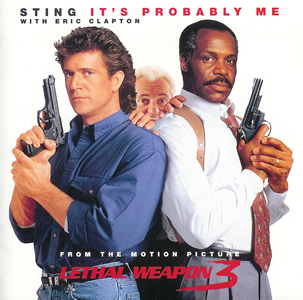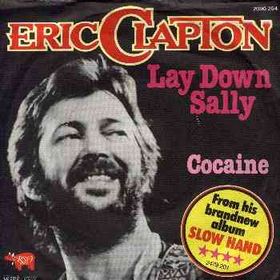
"Layla" is a song written by Eric Clapton and Jim Gordon, originally recorded with their band Derek and the Dominos, as the thirteenth track from their only studio album, Layla and Other Assorted Love Songs (1970). Its contrasting movements were composed separately by Clapton and Gordon. The piano part has also been controversially credited to Rita Coolidge, Gordon's girlfriend at the time.

The singles discography of Eric Clapton consists of 24 early career singles that Clapton recorded with various groups and singers including The Yardbirds, John Mayall & the Blues Breakers, Cream, John Lennon and the Plastic Ono Band as well as Derek and the Dominos. As a solo performer, Clapton released 91 singles and various promotional formats from 1970 to date. His most commercially successful singles are "Lay Down Sally", "Wonderful Tonight", "Change the World", "Tears in Heaven" and Bob Marley's "I Shot the Sheriff", released in 1974, charting substantially better than Marley's own earlier release had, becoming a Billboard Hot 100 number-one hit.

"White Room" is a song by British rock band Cream, composed by bassist Jack Bruce with lyrics by poet Pete Brown. They recorded it for the studio half of the 1968 double album Wheels of Fire. In September, a shorter US single edit was released for AM radio stations, although album-oriented FM radio stations played the full album version. The subsequent UK single release in January 1969 used the full-length album version of the track.

"Tears in Heaven" is a song by English guitarist, singer, and songwriter Eric Clapton and Will Jennings, written about the death of Clapton's four-year-old son, Conor. It appeared on the 1991 Rush film soundtrack. In January 1992, Clapton performed the song in front of an audience at Bray Studios, Berkshire, England for MTV Unplugged, with the recording appearing on his Unplugged album.

"Wonderful Tonight" is a ballad written by Eric Clapton. It was included on Clapton's 1977 album Slowhand. Clapton wrote the song about Pattie Boyd. The female vocal harmonies on the song are provided by Marcella Detroit and Yvonne Elliman.

Live Cream Volume II is the second live album by the British rock band Cream, released in March 1972 by Polydor Records. This album contains six tracks recorded at various performances from 9 March to 4 October 1968.

"After Midnight" is a rock song by J. J. Cale, first released in 1966. Eric Clapton later covered it for his eponymous album, released in 1970. Clapton's rendition became a success, prompting Cale to re-record the song for his own 1971 album Naturally. In 1987, Clapton later re-recorded the song for a Michelob beer commercial and then released the re-recording as a single. "After Midnight" has been considered one of Clapton's signature songs throughout his career. Other artists covered the song in later years.

"Change the World" is a song written by Tommy Sims, Gordon Kennedy, and Wayne Kirkpatrick and recorded by country music artist Wynonna Judd. A later version was recorded by English singer Eric Clapton for the soundtrack of the 1996 film Phenomenon. Clapton's version was produced by R&B record producer Kenneth "Babyface" Edmonds.

"My Father's Eyes" is a song written and performed by British musician Eric Clapton and produced by Clapton and Simon Climie. It was released as a single in 1998 and was featured on Clapton's thirteenth solo studio album, Pilgrim (1998). The song reached the top 40 on the US Billboard Hot 100 Airplay chart, peaking at number 16, which remains his last top-40 hit in said country as of 2024. It also spent five weeks at number two on the Billboard Hot Adult Contemporary chart. It became a top-five hit in Canada, where it peaked at number two, and reached the top 20 in Austria, Iceland, and Norway. In 1999, it won a Grammy Award for Best Male Pop Vocal Performance.

"It's Probably Me" is a song originally released in 1992 as a collaboration by Sting featuring Eric Clapton, Michael Kamen, and David Sanborn. Released from the soundtrack to the action comedy film Lethal Weapon 3 in June 1992, the song reached number 20 on the US Billboard Album Rock Tracks chart and number 12 on Canada's RPM 100 Hit Tracks chart. It was more successful in Europe, peaking at number one in Italy, number four in France, and number six in the Netherlands.

"Lay Down Sally" is a song performed by Eric Clapton, and written by Clapton, Marcy Levy, and George Terry. It appeared on his November 1977 album Slowhand, and reached No. 3 on the Billboard Hot 100 chart.

"Bad Love" is a song recorded by English singer and guitarist Eric Clapton, who co-wrote it with Foreigner's lead guitarist Mick Jones. The track was released in the UK in January 1990 as the first single from Clapton's 1989 studio album Journeyman.

"Forever Man" is a song from Eric Clapton's 1985 album Behind the Sun, released as the first single of the album. It reached number one on the Billboard Top Rock Tracks chart, becoming his second single to do so. In total, the single release sold more than 500,000 copies worldwide.

"I Ain't Gonna Stand for It" is the second single from Stevie Wonder's 1980 album, Hotter Than July. It reached number four on the Billboard R&B singles chart and number 11 on the Hot 100. It also hit number 10 on the UK Singles Chart. The song is famous for Wonder's imitation of a seasoned country-and-western crooner and his inspiring drumming. Charlie and Ronnie Wilson of The Gap Band provide backing vocals on the song. It was covered by Eric Clapton in 2001.

"Willie and the Hand Jive" is a song written by Johnny Otis and originally released as a single in 1958 by Otis, reaching #9 on the Billboard Hot 100 chart and #5 on the Billboard R&B chart. The song has a Bo Diddley beat and was partly inspired by the music sung by a chain gang Otis heard while he was touring. The lyrics are about a man who became famous for doing a dance with his hands, but the song has been accused of glorifying masturbation, though Otis always denied it. It has since been covered by numerous artists, including The Crickets, The Strangeloves, Eric Clapton, Cliff Richard, Kim Carnes, George Thorogood, The Bunch, and in live performances by The Grateful Dead. Clapton's 1974 version was released as a single and reached the Billboard Hot 100, peaking at No. 26. Thorogood's 1985 version reached No. 25 on the Billboard Rock Tracks chart.

"Let It Rain" is a song and single written and released by the British rock musician Eric Clapton and Bonnie Bramlett; it appears on his 1970 debut studio album Eric Clapton. In 1972 it was released as a single as part of the promotion for his compilation album Eric Clapton at His Best

"Blue Eyes Blue" is a pop song written by American songwriter Diane Warren. The tune was written for the 1999 soundtrack of Runaway Bride. The British rock musician Eric Clapton recorded the song for the soundtrack and released his performance of the song as a single on July 20, 1999, for Reprise Records.

"Promises" is a song written by Richard Feldman and Roger Linn and recorded by the British singer and guitarist Eric Clapton in September 1978. It appears on Clapton's studio album Backless.

"Hello Old Friend" is a country rock song, written and recorded by the British rock musician Eric Clapton. The track was released in October 1976 as the first of two singles from Clapton's 1976 studio album entitled No Reason to Cry.

"(I) Get Lost" is a pop song written and recorded by the British rock musician Eric Clapton. The title was released as both a single on 23 November 1999 for Reprise Records and is featured as part of the compilation album Clapton Chronicles: The Best of Eric Clapton, which was released on 12 October 1999. It was written for the movie The Story of Us.




















